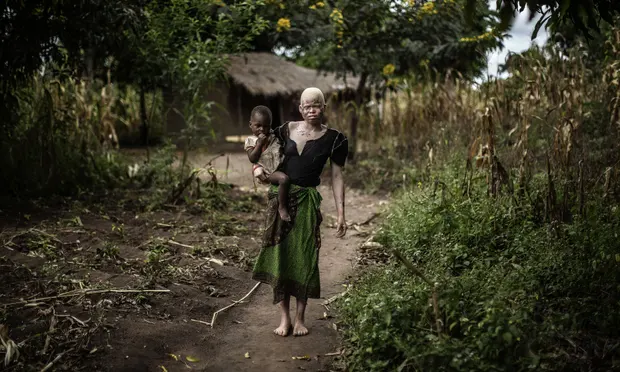Lack of access to sunscreen, diagnosis and treatment is failing a population that is increasingly vulnerable to skin cancer in a heating climate
In the early hours of Christmas Eve, William Kumwimbi, a young man with albinism, breathed his last. He had been bedridden with skin cancer for several months.
The sad news spread quickly among the community of Kamuzu Central hospital, one of Malawi’s biggest hospitals, prompting a battalion of nurses to flood the cancer ward, surrounding the 24-year-old’s bed to pay their last respects.
The news also reached Stanzio Joseph, 24, another cancer patient with albinism in the next room. He had arrived three days before from Ntcheu District hospital, about 165km (102 miles) south of the capital, Lilongwe. Kumwimbi’s death left him feeling depressed and hopeless, he said.
Rob Kingsley Banda, assistant dermatologist at Kamuzu Central hospital, was in tears when he paid his respects at Kumwimbi’s bedside. Banda, who coincidentally also has albinism, blamed the impact of the climate crisis and government negligence for Kumwimbi’s death.
“I feel the government is not doing enough on the cancer issue to persons with albinism in Malawi. It seems to neglect the situation by failing to refer patients to hospitals with capacity to treat them and, as a result, the country continues to lose people to cancer,” Banda says.
It is estimated that there are hundreds of people with albinism in rural areas of Malawi who have skin cancer but cannot access diagnosis or treatment because hospitals lack the capacity.
Banda said that when patients with suspected cancer are finally diagnosed as having the disease, they are sent to one of three referral hospitals in the country – Kamuzu, Queen Elizabeth and Mzuzu Central – where only pain relief is on offer. None of the three hospitals have any oncologists, he says. Radiation therapy is not currently available in Malawi.
“There is no treatment for cancer and even for people with albinism in Malawi, apart from chemotherapy, which is often just to relieve their pain. Cancer is untreatable in our country unless one flies to India, which requires a lot of money – more than $5,000 (£4,144). Currently, I have four patients on the cancer ward and all we do is just to relieve pain,” he says.
“I, also being a person with albinism, feel the government is not doing enough to assist us. We feel neglected. Despite recommendations to send cancer patients to India, nothing is done unless people sponsor themselves, which is not easy at all,” Banda says.
In Malawi the climate crisis has been exacerbated by huge deforestation, and the country has seen longer hot and dry seasons. In the past two decades, average temperatures have risen regularly. With almost 140,000 people in the country living with albinism, and 85% of them in poor rural areas, the heating climate has a direct impact on their skin and health.
The Association of Persons with Albinism in Malawi (Apam) says there is a lack of access to medication, sunscreen and early-stage cancer screening because of the absence of any dermatology or ophthalmology services in rural health facilities.
Young Muhamba, Apam’s president, says the absence of medical services is another level of discrimination for an often ostracised population who already face brutality and even ritual murder in Malawi.
People with albinism have little or no melanin in the skin, which leaves them especially vulnerable to the damaging effects of sunlight. According to a 2014 study published in BMC Cancer, the risk of developing skin cancer for someone with albinism is 1,000 times higher than for the general African population.
Despite health specialists and environmentalists pointing to the lack of data on skin cancer as a public health problem directly linked to the climate crisis, the issue has gained little traction with the government of one of the poorest countries in southern Africa.
According to Apam’s estimates, Malawi has been losing at least two people with albinism to skin cancer every month since 2020.
“These prolonged hot periods have contributed to high cancer prevalence among persons with albinism in Malawi,” Muhamba says.
“The unavailability of sunscreen lotion and non-existence of early-stage cancer screening has posed a great challenge that has led to more than 52 persons with albinism dying since 2020,” he says.
Banda says he is seeing too many young Malawians die unnecessarily. “This is letting us live in fear as persons with albinism, just because of our skin.”
source: the guardian
















